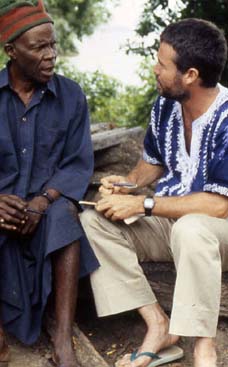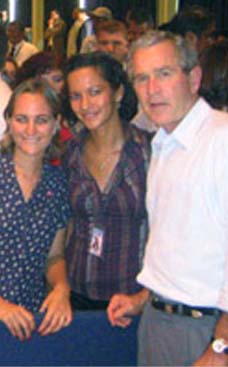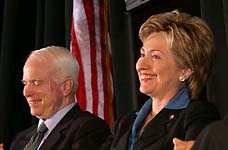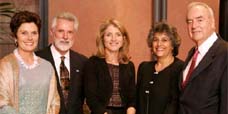
The Pentagon plans to spend hundreds of millions of dollars over the next five years to bolster foreign language skills within the military, a move to correct what is considered a critical handicap as soldiers pursue missions in Iraq and Afghanistan, according to documents and defense officials. It also provides more foreign language-proficiency pay for service members who become fluent in a language and creates a 1,000-member Civilian Linguist Reserve Corps, language experts who would be on call for military missions, the documents show. "What if we had a platoon of soldiers and Marines that had been, let's just say, in Iraq for a decade or more? Think how much more culturally attuned we might have been to conditions there?"
Military aims to bolster language skills
Military aims to bolster language skills
Pentagon plan would spend hundreds of millions of dollars to solve problem exposed in Iraq, Afghanistan
By Tom Bowman
Sun reporter
Originally published January 2, 2006
WASHINGTON // The Pentagon plans to spend hundreds of millions of dollars over the next five years to bolster foreign language skills within the military, a move to correct what is considered a critical handicap as soldiers pursue missions in Iraq and Afghanistan, according to documents and defense officials.
The effort is part of a broader plan, expected to be unveiled by President Bush this week, that will also include new language programs through the State and Education departments, officials said. There was no immediate estimate on the total cost of the plan, although officials expect it to range in the hundreds of millions of dollars from fiscal 2007, beginning in October, to 2011.
The project will include increased language instruction at the U.S. Naval Academy and other military schools, increased pay for service members with language skills, and the creation of a 1,000-member civilian cadre of linguistic experts who can be on call for military operations.
The U.S.-led missions in Iraq and Afghanistan have exposed the inability of most military personnel to converse in Arabic or the primary languages of Afghanistan -- Dari Persian and Pashtu. Such a dearth in knowledge comes at a particularly sensitive time, when the Americans must work closely with the local populations, training soldiers and police, and helping create government institutions, defense officials and military officers said.
"This is a larger effort within the Defense Department for language studies and cultural awareness," said Lynne McCann, chief of the Army Foreign Language Proponency Office at the Pentagon. "There's a lot more emphasis. It started with the global war on terror. Our need for Arabic was greater than our capability."
Pentagon documents reviewed by The Sun show plans to provide funds for additional instruction, immersion and semester abroad opportunities at the three military academies, and expanded language instruction for ROTC students at universities. Military officials also are considering a language requirement for those receiving an officer's commission through ROTC, officials said.
The document points to the need for "strategic stronghold languages" but was not specific about which ones. Officials said some of those languages include Arabic, Chinese and Korean, but several studies are under way to identify additional languages that could benefit military efforts.
Besides the service academies and ROTC, more money also will be set aside for the Pentagon's Defense Language Institute, based in Monterey, Calif., which would receive an additional $362 million over the five years, officials said. Part of that money would be used to create smaller class sizes that are more conducive to language study, and to expand the current 63 weeks of instruction to 77 weeks, officials said.
It also provides more foreign language-proficiency pay for service members who become fluent in a language and creates a 1,000-member Civilian Linguist Reserve Corps, language experts who would be on call for military missions, the documents show.
In addition, the Pentagon would establish a National Security Education Fund to create language magnet programs for students in the K-12 grades along with five new university programs. "We need to start growing them early," McCann said.
About 17,000 military personnel, of an active and reserve force of about 2 million, have some ability in languages such as Arabic, Chinese, Farsi, Urdu, Hindi and Korean, a defense official said. "The department's goal remains increasing the language capability in the less commonly taught languages and ultimately creating a cadre of language professionals with a high level of language proficiency," the official said.
McCann estimated that about 2,000 soldiers have some level of Arabic-speaking skill in the 492,000-soldier active-duty Army.
That relatively small number of Arabic speakers in the Army quickly became apparent after the fall of Baghdad in April 2003, when officers at times resorted to sign language to communicate. And even when Arabic-speaking soldiers were available, they often were not native speakers and at times missed the nuance of the local dialect. One major said last year that there was just one native Arabic-speaking soldier in his brigade, which numbers between 3,500 and 4,000 soldiers.
In the spring, the National Guard started a program to recruit hundreds of Arab-Americans as cultural advisers and translators, targeting the states of Michigan, California and Texas, which have large Arabic-speaking populations.
The Army's top training officer, Gen. William Wallace, told reporters last month that he was focusing more on language skills throughout the Army, including the use of online courses for soldiers. Wallace has also created an Emerging Languages Task Force to determine which "future threats" the country faces and which languages and geographic areas it must study.
"The task force is determining what we're not teaching that we may have to," Wallace said.
Despite the renewed interest in language training, retired Army Maj. Gen. Robert H. Scales Jr., a Vietnam War veteran and former commandant of the U.S. Army War College, is critical of parts of the plan.
Scales said the Army has done little in the past to encourage language training or to promote officers seeking to develop expertise in language and culture for careers as foreign area officers. "They are notoriously unable to be promoted," he said, explaining that the Army -- as well as the other services -- tend to promote operations officers -- those who drive tanks, fly planes and command ships. "What needs reform is the personnel system that selects and promotes officers."
There are some prominent exceptions, he said, pointing to Lt. Gen. Karl Eikenberry, who is fluent in Mandarin and spent years serving as a foreign area officer in cities throughout China. Eikenberry is now the top commander of U.S. and allied forces in Afghanistan and is successful there because of his experience working with other cultures, Scales said.
Army officials concede that foreign area officers often faced a "glass ceiling" when it came to promotions and that they plan to give these officers more of an opportunity to reach senior rank.
Scales also said that language training is a small part of the effort. "The real issue is cultural awareness," he said. For a decade, Scales has pushed the idea of a "global scout," a military officer who can live for years or decades in another country, gaining expertise in language and culture, and developing ties with emerging civilian and military leaders. The British have a long tradition of such officers, most notably T.E. Lawrence, who rallied the Arab tribes against the Ottoman Turks during World War I and gained renown as "Lawrence of Arabia."
Testifying before a House committee in October, Scales said: "What if we had a platoon of soldiers and Marines that had been, let's just say, in Iraq for a decade or more? Think how much more culturally attuned we might have been to conditions there?"
Officials at the Naval Academy and the U.S. Military Academy said they have been in talks with Pentagon officials about the planned boost in emphasis on language skills.
"West Point hasn't been told specifically what it will be translated into. All that's still in the talking stages," said Lt. Col. Kent Cassella, an academy spokesman. The school has offered seven languages, including Arabic and Chinese, since the 1970s, he said, and the additional Pentagon money might allow West Point to expand its semester abroad program to include its first Arab country, Jordan.
At Annapolis, which added Arabic to its current seven-language curriculum two years ago, Bill Miller, the school's academic dean, said there are plans to add majors in regional studies, including the Middle East and Asia, and include Arabic, Chinese or Japanese as part of the course of study.
Miller said the extra money from the Pentagon could help finance a four-week foreign immersion program, which is now funded by private grants and $1,200 from each midshipman who takes part.
tom.bowman@baltsun.com
















